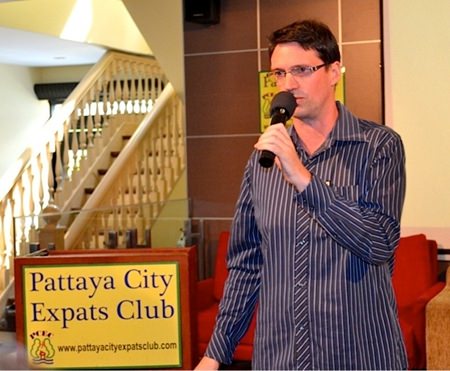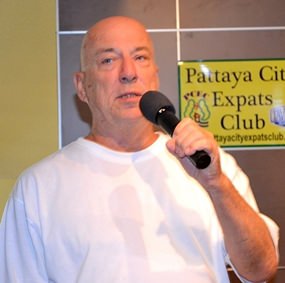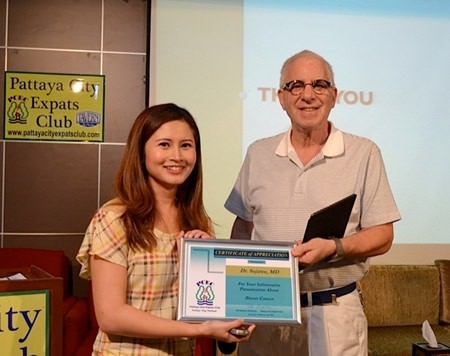Breast cancer is the second leading cause of death among women – after cervical cancer – not only in the West but also in Thailand. This was one of the observations made by Dr. Sujaree, a general surgeon from Phyathai Sriracha Hospital, when she spoke to the Pattaya City Expats Club at their Sunday, February 16 meeting.
She received her degree from the Faculty of Medicine Ramathibodi Hospital with additional studies in Advance Trauma Life Support and Definitive Surgical Trauma Care. Prior to joining Phyathai Sriracha Hospital, she was a General Surgeon at Naradhiwas Rajanagarindra Hospital. The hospital also had a nurse available to give free blood pressure checks.
 PCEC Member & Phyathai Sriracha Hospital’s International Department Manager, Gavin Wadell, introduces Dr. Sujaree, a general surgeon from Phyathai Sriracha Hospital.
PCEC Member & Phyathai Sriracha Hospital’s International Department Manager, Gavin Wadell, introduces Dr. Sujaree, a general surgeon from Phyathai Sriracha Hospital.
Dr. Sujaree explained what when it occurs, breast cancer is usually found in one of two areas in the breast: the lobule (the parts of the breast that produce milk) or the inner linings of the milk duct. She mentioned that in the U.S.A., one in eight women will develop invasive breast cancer, and one in 36 women will die from it. In 2014, it is estimated that the U.S.A. will see almost 233,000 new cases of invasive breast cancer and 40,000 deaths.
 Dr. Sujaree explained that when it occurs, breast cancer is usually found in one of two areas in the breast: the lobule (the parts of the breast that produce milk) or the inner linings of the milk duct.
Dr. Sujaree explained that when it occurs, breast cancer is usually found in one of two areas in the breast: the lobule (the parts of the breast that produce milk) or the inner linings of the milk duct.
She said that the risk factors for breast cancer are: (1) being more than 40 years of age; (2) having a family history of breast cancer; (3) starting one’s period at a very young age; (4) entering menopause later than most women; (5) smoking; and (6) having a first child after 30 years of age.
Further, women are encouraged to do self-examination of their breasts once a month and consult a doctor if they detect something that feels like a lump; any abnormal nipple discharge; any inflammation; any dimpling (a slight depression or hollow area); any puckering (wrinkles or irregular folds of the skin); and any retraction of the nipple.
Women should also see their doctor if they notice any change in breast size; any difference between the two breasts; any pain or tenderness; any redness; any change in the position of the nipple; any scaling around the nipples; and any sore on the breast that does not heal. Also, she advises women, not only to do a self-examination monthly, but also to see their doctor for a check-up once a year, and to have a mammogram at age 35 and then every year from age 40 on.
Diagnosis of breast cancer is done using a clinical breast examination, mammography, ultrasound or a core needle biopsy (or some combination of these), Dr. Sujaree explained. Additionally, treatment for breast cancer that is detected early is usually conservative. It can involve removal of a lump or chemotherapy. In advanced cases, it is usually necessary to remove the breast. Other interventions may be necessary if the cancer has spread beyond the breasts.
 Roy Albiston conducts the always interesting Open Forum, where questions are asked and answered about ‘Expat living’ in Thailand, especially in Pattaya.
Roy Albiston conducts the always interesting Open Forum, where questions are asked and answered about ‘Expat living’ in Thailand, especially in Pattaya.
During the question and answer period after the presentation, in response to a question, Dr Sujaree said that men can get breast cancer too, but that they represent less than one percent of all cases. The symptoms and diagnostic routines are similar, but a tissue sample would be taken instead of doing a mammogram. Dr Sujaree also agreed that breast feeding is a good cancer prevention strategy. She also said that a mammogram is a better diagnostic tool than ultrasound but doctors usually do both. She added that in very young women, sometimes only ultrasound is used.
Finally, Dr Sujaree said that symptoms that are similar to those of breast cancer may be the result of non-cancerous conditions like an infection or a cyst.
Then, Master of Ceremonies Richard Silverberg brought everyone up to date on upcoming events and called on Roy Albiston to conduct the always interesting Open Forum where questions are asked and answered about Expat living in Thailand, especially Pattaya.
For more information on the many activities of the Pattaya City Expats Club, visit their website at www.pcecclub.org.
 MC Richard Silverberg presents Dr Sujaree with a Certificate of Appreciation for her most informative & well illustrated presentation.
MC Richard Silverberg presents Dr Sujaree with a Certificate of Appreciation for her most informative & well illustrated presentation.




